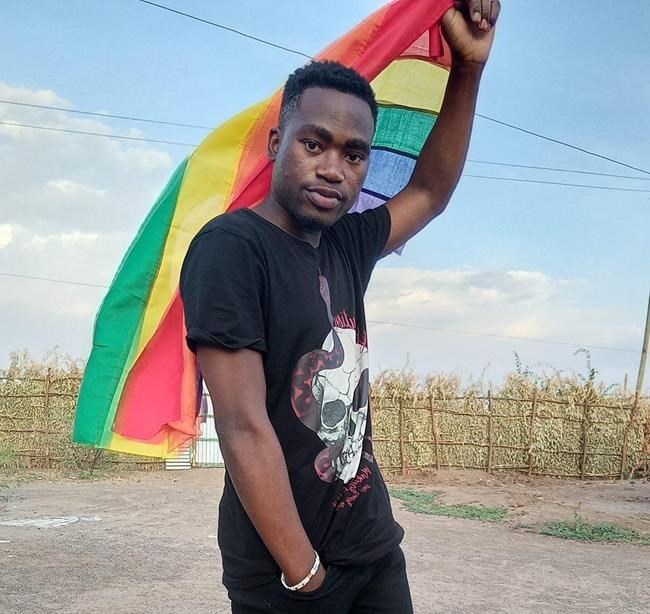Paul Canary Kanyamu says life felt like "hell on Earth" before he escaped violence and found refuge in Canada about two months ago.
"I was punched, I was pushed into a ditch, my leg was broken and I was brutally assaulted countless times," the 26-year-old, who was born in Uganda and identifies as gay, recalls in an interview about the years he spent in East Africa before his arrival to Vancouver.
"I was brutally assaulted by my own parents and the community. They threatened to kill me through poisoning. It was really (a) very sad time."
Despite how difficult it is to tell their stories, the human rights activist and other LGBTQ refugees say they want Canadians to learn more about how the community is being brutally persecuted around the world.
Earlier this year, Uganda became the latest country to pass an anti-gay bill making it a crime to identify as gay, and imposing tough sentences, including the death penalty in some cases.
The CEO of Rainbow Railroad, a Canadian government-funded group that helps LGBTQ people escape state-sponsored violence, says at least 70 countries criminalize same-sex intimacy.
"There's certainly a steady number of LGBTQI+ people resettling into Canada, in the face of the fact that there are now more displaced people than ever before," says Kimahli Powell.
Powell says the number of LGBTQ refugees has been growing as the United Nations High Commissioner for Refugees (UNHCR) estimates a total of 110 million people are displaced around the world by war, persecution and human rights abuses.
Powell says Canada doesn't collect data on how many LGBTQ refugees settle in the country every year, but it should. He says they face unique challenges that the country needs to do more to address.
"For instance, when you arrive in Canada, they're also being faced by people who come from the same country that's persecuting them. That's a really unsafe environment for people to be in," he says.
In Canada, statistics show reports of hate crimes targeting transgender and a gender people have also increased, and experts say attacks on LGBTQ people are higher than what's been reported to police.
But for Kanyamu, the challenges he faces in Canada don't compare to the violence he dealt with in East Africa.
The refugee camp was worse than what he expected and he says he was regularly targeted there, despite his pleas to police.
"The community was very hostile. Some people are being killed. Some people are being raped. They don't like LGBTQ persons because they believe we are agents of the devil, we're the ones causing COVID-19, we are the ones causing famine, and all that stuff," he says.
After Kanyamu lived in the camp for about five years, Kenya's president condemned a Supreme Court ruling that sided with an LGBTQ rights group, and that's when it became clear to him he needed to leave.
He connected with another friend who put him in touch with a Canadian LGBTQ organization called Reaching Out Assisting Refugees, and was privately sponsored by a family in British Columbia.
Since his arrival in April, Kanyamu says his life has transformed.
"I'm loving Canada," he says.
Kanyamu says he and his partner have found safety in the LGBTQ community in Vancouver. They have been resting, looking for work, and Kanyamu wants to pursue an education in social work.
Rustam, a 23-year-old bisexual man from northern Afghanistan, also says Canada has become a land of opportunity for him since he arrived in Calgary a little more than a year ago.
He did not want to be identified by his full name due to safety concerns for his family in Afghanistan.
A report by Human Rights Watch and OutRight Action International released last year said LGBTQ people in Afghanistan are facing grave threats to their safety and lives, especially since the Taliban took over in 2021.
Rustam says he left the country a few years before the Taliban takeover to study in Turkey, but his visa was expiring and he couldn't return home as the violence escalated.
"I started to apply to lots of countries including Canada, United States, the United Kingdom, some European countries," he says during an interview from his home in Calgary.
"Luckily, I (heard) back from Canada."
When he arrived, he was met with a big shock.
"I was surprised everyone is free to be whatever they want," he says.
"If I was in Afghanistan, I might (have) not survived."
Around the same time Rustam arrived in Canada, Yevheniia Kotenko and her partner were being evacuated from Ukraine after Russia launched a full-scale invasion.
Kotenko, who uses an alias because her entire family doesn't know she's pansexual and married to a woman, says she didn't arrive in Canada as a refugee but under a special government program that fast-tracked immigration for Ukrainians fleeing the war.
Although it is not a crime to be a member of the LGBTQ community in Ukraine, same-sex marriage is still not permitted. Kotenko says that's why she and her partner were so happy to get married three months after their arrival.
"There are definitely some things that I miss in Ukraine, but I feel like Canada is just the perfect place to live," she says.
This report by The Canadian Press was first published on June 21, 2023
Fakiha Baig, The Canadian Press



